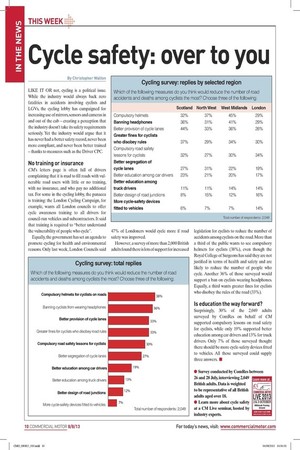Cycle safety: over to you
Page 8

If you've noticed an error in this article please click here to report it so we can fix it.
LIKE IT OR not, cycling is a political issue. While the industry would always back zero fatalities in accidents involving cyclists and LGVs, the cycling lobby has campaigned for increasing use of mirrors, sensors and cameras in and out of the cab — creating a perception that the industry doesn't take its safety requirements seriously. Yet the industry would argue that it has never had a better safety record, never been more compliant, and never been better trained — thanks to measures such as the Driver CPC.
No training or insurance
No training or insurance
CM's letters page is often full of drivers complaining that it is mad to fill roads with vulnerable road users with little or no training, with no insurance, and who pay no additional tax. For some in the cycling lobby, the panacea is training: the London Cycling Campaign, for example, wants all London councils to offer cycle awareness training to all drivers for council-run vehicles and subcontractors. It said that training is required to "better understand the vulnerability of people who cycle". Equally, the government has set an agenda to promote cycling for health and environmental reasons. Only last week, London Councils said 47% of Londoners would cycle more if road legislation for cyclists to reduce the number of safety was improved. accidents among cyclists on the road. More than
However, a survey of more than 2,000 British a third of the public wants to see compulsory adults found there is lots of support for increased helmets for cyclists (38%), even though the Royal College of Surgeons has said they are not justified in terms of health and safety and are likely to reduce the number of people who cycle. Another 36% of those surveyed would support a ban on cyclists wearing headphones. Equally, a third wants greater fines for cyclists who disobey the rules of the road (33%). 47% of Londoners would cycle more if road legislation for cyclists to reduce the number of safety was improved. accidents among cyclists on the road. More than
However, a survey of more than 2,000 British a third of the public wants to see compulsory adults found there is lots of support for increased helmets for cyclists (38%), even though the Royal College of Surgeons has said they are not justified in terms of health and safety and are likely to reduce the number of people who cycle. Another 36% of those surveyed would support a ban on cyclists wearing headphones. Equally, a third wants greater fines for cyclists who disobey the rules of the road (33%).
Is education the way forward?
Surprisingly, 30% of the 2,049 adults surveyed by ComRes on behalf of CM supported compulsory lessons on road safety for cyclists, while only 19% supported better education among car drivers and 13% for truck drivers. Only 7% of those surveyed thought there should be more cycle-safety devices fitted to vehicles. All those surveyed could supply three answers. •
• Survey conducted by ComRes between 26 and 28 July, interviewing 2,049 British adults. Data is weighted to be representative of all British adults aged over 18.
• Survey conducted by ComRes between 26 and 28 July, interviewing 2,049 British adults. Data is weighted to be representative of all British adults aged over 18.
• Learn more about cycle safety at a CM Live seminar, hosted by industry experts.









































